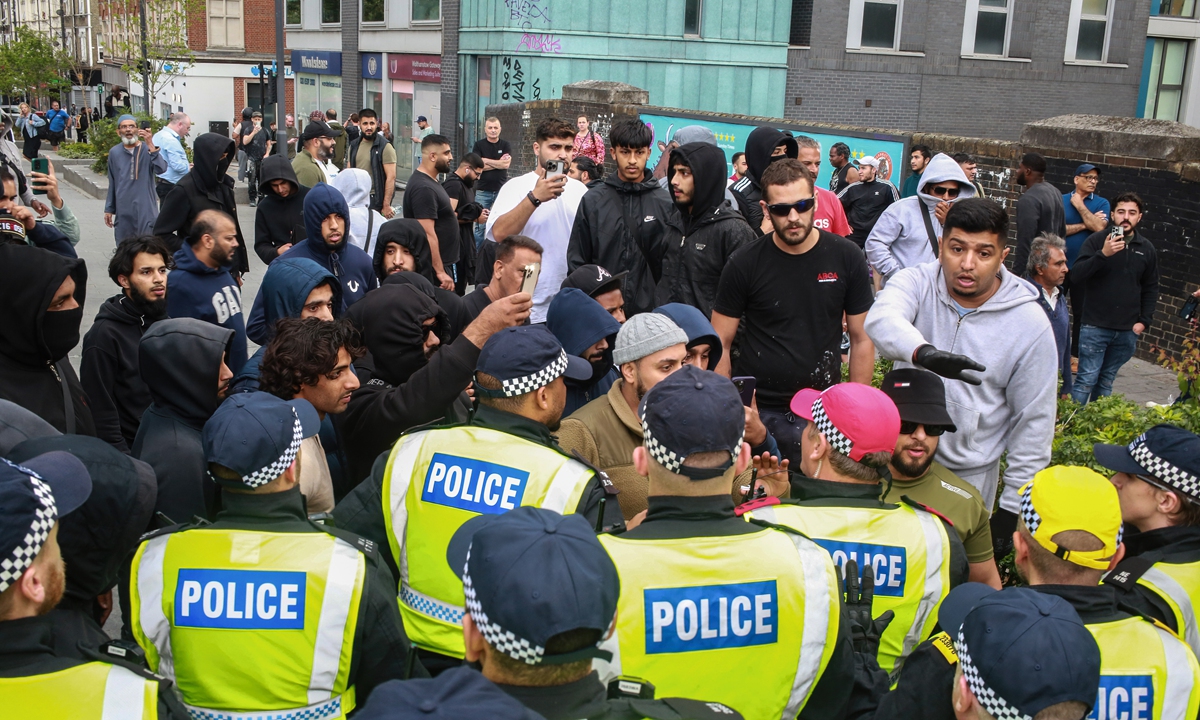
Police cordon off an area in London as crowds gather for a rally against the far-right and racism on August 7, 2024. People held rallies in London to defend a list of locations thought to be targets for violence by the far-right, including refugee charities and immigration centers. Photo: VCG
The anti-migrant riots that have broken out across the UK over the past week marked the worst social unrest in Britain in 13 years. Although the far-right demonstrations that had been anticipated by police failed to materialize Wednesday, Chinese nationals working and living in the country said they have growing safety concerns, and fear that the chaos has yet to come to an end.British Prime Minister Keir Starmer and the police have been struggling to end a series of riots that began last week after three young girls were killed in a knife attack in Southport, northwest England. Before the suspect's identity was confirmed, false rumors spread online claiming the suspect was a Muslim asylum seeker. Far-right groups exploited this narrative to incite tensions and spread Islamophobic sentiment, resulting in attacks on immigrants.
On Wednesday, large anti-racism groups gathered in London, Bristol, Oxford, Liverpool, and Birmingham to challenge expected far-right marches that failed to materialize. Over 6,000 specialist police were reportedly mobilized amid concerns of a repeat of the past week's violence, according to media reports.
The Chinese Embassy in the UK on Wednesday released a notice, saying that multiple incidents of unrest and public security issues have occurred in various parts of the UK and the embassy and consulates in the country once again remind Chinese citizens, including tourists, to closely monitor local security conditions and avoid areas where incidents have occurred.
"Please pay close attention to the continuous safety alerts issued by the Embassy and Consulates and take practical measures to enhance personal safety. In case of an emergency, promptly seek help from the police and contact the Chinese Embassy or Consulates in the UK," read the notice, which also listed hotlines for consulate services and emergencies.
The riots that erupted on July 30 have worried people living in the UK.
Shang Guanjia, a Chinese postgraduate student currently studying at the University of Nottingham, said, "Last Saturday, I had planned to go to the movies, but after seeing the news about the riots, I didn't dare go out, as it was the first time that I had heard of large-scale riots happening in Nottingham."
The university and apartment management also sent students emails to remind them of security issues.
Huang, who lives in Southampton, Hampshire, told the Global Times that she was supposed to leave for work on Wednesday as planned, but with protests occurring nearby, her boss told her to take the day off. When she went to pick up her food delivery in the evening, apartment staff also advised her to avoid the gate to prevent possible attacks by protesters.
Many local shops and supermarkets were boarded up, and Chinese supermarkets and restaurants were all closed, Huang said.
Mu Mu, who lives in London, told the Global Times on Thursday that "as a Chinese person or a person of color in the UK, I'm definitely concerned about the xenophobia across the country."
Currently, the situation in London is better than in other cities and towns because of stronger law enforcement. "In cities like Southampton and Nottingham, there are more residents who live in unsatisfactory situations, leading to stronger anti-foreigner sentiment," Mu said, noting that the situation is "worrisome."
Continuing unrest
British Prime Minister Starmer, who took power on July 5, warned rioters that they would face lengthy jail terms. On Sunday, he blamed far-right instigators for circulating rumors and organizing protests, saying that "This is not protest. It is organized, violent thuggery," according to AP.
The British government is using various methods to calm the riots, such as arresting those involved in violence and imposing steep penalties. While the scale of the riots may not expand further, they are unlikely to subside soon, Li Guanjie, a research fellow with the Shanghai Academy of Global Governance and Area Studies under the Shanghai International Studies University, told the Global Times on Thursday.
The reasons behind the riots are complex. Analysts say that with economic growth slowing down and the wealth gap widening, dissatisfaction and frustration among low-income groups are increasing. Social issues such as housing shortages have also exacerbated tensions. The declining economy in the UK has led to a "witch hunt" with many people seeking out someone to blame.
The economy is not the only factor behind the riots. Li Guanjie, a research fellow with the Shanghai Academy of Global Governance and Area Studies under the Shanghai International Studies University, noted that the British government encouraged and welcomed immigrants during economic booms, but as development slows, discontent related to the increase in immigrants are emerging. The differences in religion, culture, and values between immigrants and locals are difficult to reconcile.
Analysts said that the predicament the UK is facing is a microcosm of the broader challenges confronting many European countries as they face a series of problems related to migration, as well as the rise of far-right sentiment.
While UK and EU political leaders are grappling with domestic issues, the Russia-Ukraine conflict is further consuming these countries' resources, leading to increased domestic dissatisfaction and a growing crisis, said Li.
Even after the riots ends in the UK, similar unrest may erupt in the country and across the EU, such as attacks targeting Muslim communities or mosques, experts said.


